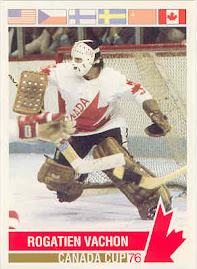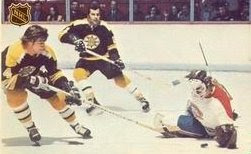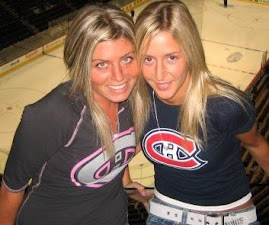
As everyone did, I enjoyed the Habs pounding of the Hurricanes last night.
Thumbs up to a killer power play and a four point game for Tomas Plekanec. Kudos to the toughness of Tom Kostopoulos and Francis Bouillon. Props to Alex Kovalev, who remains motivated and played his 1000th career game like the player I want him to be. A big high fiver to Kyle Chipchara for showing why he has become a regular while making the Habs fourth line a going concern for opposing teams.
Hey, I hate the Hurricanes as much as anyone - maybe more, so there was alot to like about this game.
On the surface.
Unfortunately, beneath the glitter of a half dozen highlight reel goals and a running up of the score was one ugly performance that showed the team still needs to mature.
Hockey is sometimes a game a that would perplex even the most astute of sports psychiatrists. Teams have a bad minute or a rough shift in a certain game and it costs them. A good example is last weeks meeting with the Florida Panthers, where 58 good minutes of excellent hockey wasn't quite enough.
Last night against the Hurricanes, roughly 20 minutes of good play, led by a killer PP unit, sufficed for a win.
For the remainder of the game, the Habs were butt ugly, and that is exactly where they might have been bitted were it not for a break or two.
Considering that this season Habs are young in experience, and playing with large leads is not a common occurrance, they are not used to dealing with what needs to be taken care of in games such as these.
When it comes to blowouts, "often" is a word they seldom use.
There are two points of view in how teams should go about duties when entering the second period with a 5-1 lead. The teams who are inexperienced, are loaded with players seeking to pad their stats. Experienced teams know better, and look to bag the two points by throwing a blanket over the opposition.
You don't see the Detroit Red Wings blowing 5-1 leads, that's something the Maple Leafs do. There are many reasons why.

The 1970's Canadiens used to drive my father right nuts, sitting on leads and subtly dumping endless pucks down ice and controlling the flow of the game. By playoff time, the discipline was perfected.
Does it make for dull hockey?
Of course it does, but that's beside the point - which is the two points.
The Canadiens should pour it on, and put the other team away, you say.
That has already been done. The score is 5 - 1! Stick a fork in the 'Cane's butts and turn 'em over - they're cooked!
The team is playing on the road and doesn't have the last line change. There is no need to entertain the fans as they are not playing at home. The Canadiens have another game within 24 hours, so it was time they shut this one down.
I've had the pour it on versus shutting it down argument for years with everybody from my father to other hockey coaches I have been associated with or had known while coaching.
Often the misconception of the pour it on method is based on the fact that the same 1970's Habs teams were equally adept at both. They could run up the score, or turn the bore into a snore.
Both ways worked wonders, but it was the hypnotism of dullness that was preferred come playoff time.
I recall the fifth game of the 1979 Stanley Cup playoffs against the New York Rangers as the ultimate snorefest in the ultimate game. The Blueshirts came out guns-a-blazing, having their backs to the wall facing elimination. It was Rangers coach fred Shero's style to create and provoke anything, and the Habs sat back, ate them up, and spat them out. Once they had a 4-1 lead, the Canadiens let the Rangers chase dumped pucks for close to 40 minutes. By the third period, the Rangers simply gave up, ill equiped to beat the impenetrable wall the Habs had set up.
No one likely remembers this game as a benchmark of great hockey. Fans do recall that the Canadiens won four straight Cups.
Just as winning the Stanley Cup was the objective in that particular game all those years ago, winning the two points last night isn't at all disimilar.
There's no need to remind anyone that these boys ain't the '77 Habs by any stretch!
The point in matter of proceding is all about that singular objective. Fashion points for stylishness of wins matter little in the end.
The current edition of the Montreal Canadiens needs to learn the distinction.






























































































































































6 comments:
Hello again,
You are right on the money about the 2 points. I also agree about the shutting down. But it's the method I have issue with.
Methodically dumping the puck into the other team's zone is a give-away and requires your team to work hard (or hope) to get it back. The best way to kill a game is, and always will be, holding onto the puck yourself. It is a tad more difficult and surprisingly even more dull. Watch an Italy soccer game to see how to prevent a team from creating anything to come back from 1-0. It's also the feeling I used to get when the Habs played the Sens.
Yes, dumping is a give away - technically. The difference is, that it is one that the team is in control of, and not forced into. Being that he dump is at the farthest reaches of the ice, there should be no harm in it. Doing it right, which is a softer shot, and placing it timely, allows a defensive trap to set up. Fresh lines come over the boards to defend against tired and frustrated opponants that cannot shift at will, thus playing into the ploy. The opponant then has to attempt lines changes while on attack, thus compromising the effectiveness of the attack.
One really has to look at what is not happening, to understand why it works.
Topham, if you say holding onto the puck is more difficult, how can say it's more efficient?
Holding onto to the puck enables the opposition to come at you. The puck travels faster when it isn't stuck to a player's stick. In my method of boredom, the team works but half the ice with double the energy if the conviction is there.
Sorry that I cannot equate any of this to soccer - I've never stayed awake for a full game! Let that testify to it's effectiveness. :)
Last season the habs would have lost the 5-1 lead. The game would have been sent to a shoot-out and possible loss.
The Canes were flat but still a good team that's why the push they gave looked more dangerous then with most teams.
I love the fact Montreal is always going for a goal, It would have been really boring and the Canes might have won if we stopped to protect at 3-1 or 4-1. The Habs sensed Ward was off and just kept going. Good for them, they got some bounces.
It's refreshing to see these blow-outs and our boys catching some breaks. They didn't blow the lead in Boston?
I say keep doing what they are doing....it's fun!!!!!
KILL THE PENS TONIGHT!!!!!!!
Besides if they shut down last night to protect the lead, this article would be about How Gainey and Carbo are dictating a boring defensive team sytem.
No Thankss, I 'd whine just like Kovalev would.
Anonymous - This article was about why Gainey and Carbonneau should be, and likely are dictating a boring defensive team system. The point was not about the excitement of the game. A team only has so many opportunitites to learn how to properly defend the lead in a season. Your comment misses the point.
The Habs flunked this mission. From the second period on, discounting an empty netter, the Hurricanes won the final 40 minutes 3-1.
If you want to choose exciting bad hockey over the boring effectiveness of sound teachings that lead to greater things, I know a team that wears blue and white that's just made for you.
IMO, this team in the past couple of seasons have lost more games in the third period by trying to sit on the lead rather than keep attacking, which was what give them the lead in the first place.
Look no further than the Brind'Amour goal last night. The team kept colapsing & trying to chip the puck out & eventually it finds it way behind Huet.
Defending a lead is ten times harder than trying to score more.
As for Detroit, they play a puck possession game, so dumping the puck away has nothing to do with how they play.
To reply to your earlier reply. I probably wasn't clear in my definition of holding the puck. What I meant was the team holding the puck, not one player. Then the puck does travel fast as you said and the other team is constantly chasing you. Effectively, it's a game of keep away, which if you've ever been the player trying to get that puck, you know is exhausting, frustrating and can be disheartening.
Also, let's be clear: it is more difficult for the team to perform and perhaps less efficient for sparing energy. However, in the fact it keeps the puck away from the opposition entirely, it is 100% more efficient (assuming the dumping team wins a generous 50% of their own dump ins).
I used to play waterpolo as well, which is obviously very different to hockey in many ways, but the alike in the imortance of possession. When a team has the ball, it is very difficult for the other team to steal it, mainly because of the nature of the rules. However, most goalies are very good and can save the majority of shots, therefore a shot is a give away. We would instruct players never to shoot near the end of the game witha lead to prepare a more efficient defense, where we would not have to rely on our own goalie to make saves.
Although the analogy is not perfect (maybe soccer isn't either, especially if you can't stay awake long enough to appreciate what I am banging on about), I feel it is fitting. Passing when excuted well (though difficult) is the most efficient way to keep the puck away from the other team and therefore keep the play. Consequently, good passing takes technical mastery but not much energy expediture, which is contrary to chasing a dump in, battling for the puck on the boards or playing defense. So, as a result decreases the need for line changes.
Sometimes I can see it, and you articulated it well - the goal of the teams with a lead becomes making line changes, rather than holding the puck. The fear being that a line could be caught getting tired and give up a chance. In my opinion, this is a faulty approach, simply because of the turn overs it creates. These players are fitter now, but their fitness is being employed to give a series of intense sprints and not to endure for extended periods at a manageable level.
A team could really change the face of the game if they dared to play possessionally instead of by 45 second spurts. I doubt it will happen soon, but you never know.
Post a Comment